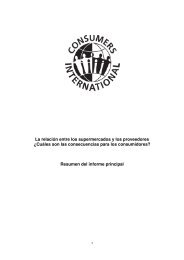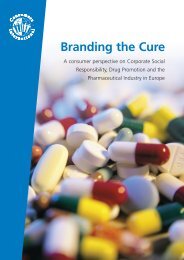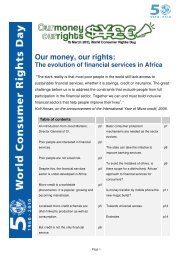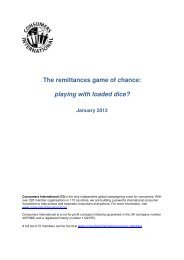Voices for Change: the Consumer Right to Representation
Voices for Change: the Consumer Right to Representation
Voices for Change: the Consumer Right to Representation
Create successful ePaper yourself
Turn your PDF publications into a flip-book with our unique Google optimized e-Paper software.
World <strong>Consumer</strong> <strong>Right</strong>s Day 2002: <strong>Voices</strong> <strong>for</strong> <strong>Change</strong><br />
of industrial and commercial interests, and<br />
biases against NGOs. However CI has made<br />
well-recognised ef<strong>for</strong>ts <strong>to</strong> support <strong>the</strong> Codex<br />
Secretariat in developing mechanisms <strong>for</strong><br />
increasing consumer involvement in Codex<br />
and in moni<strong>to</strong>ring implementation of <strong>the</strong>se<br />
mechanisms.<br />
Among <strong>the</strong> lessons learned are those that<br />
“future project(s) should be wider than Codex<br />
and deal with food safety issues more<br />
generally,” <strong>the</strong> evaluation concludes. “<br />
[They] should still include <strong>the</strong> international<br />
representation work of CI at Codex, but this<br />
should be part of a broader project dealing<br />
with food safety more holistically.”<br />
Trade: Changing Mechanisms<br />
Markets have been <strong>the</strong> stage <strong>for</strong> consumer<br />
protection laws since <strong>the</strong> Hammurabi Code<br />
decreed trial by ordeal <strong>for</strong> dishonest wine<br />
sellers some 4000 years ago. Today,<br />
consumers seek protection from global<br />
markets by seeking <strong>the</strong>ir say in international<br />
institutions created <strong>to</strong> dictate contemporary<br />
rules of play.<br />
The difficulties of building CI representation<br />
in an area like international trade where<br />
consumer groups have not traditionally<br />
worked are three-fold, according <strong>to</strong> CI’s<br />
Global Programmes Manager, Jayanti Durai.<br />
First, consumers are generally unaware of<br />
<strong>the</strong> implications of trade rules on <strong>the</strong>ir lives.<br />
Second, consumer organisations often do not<br />
feel com<strong>for</strong>table in engaging in <strong>the</strong>se issues,<br />
as <strong>the</strong>y aren’t used <strong>to</strong> discussing trade and<br />
economics issues. Third, policy-makers may<br />
not think that consumer organisations have<br />
anything <strong>to</strong> say or that what <strong>the</strong>y say<br />
is credible.<br />
Most consumer work is based on bringing<br />
research <strong>to</strong> light <strong>to</strong> support a particular point.<br />
In trade work, consumer representatives are<br />
expected <strong>to</strong> be lawyers or economists, or both.<br />
<strong>Consumer</strong> organisations are none<strong>the</strong>less<br />
growing more aware of trade and are<br />
beginning <strong>to</strong> be able <strong>to</strong> assess its impact.<br />
The main difficulty consumer representatives<br />
now face is that governments appear <strong>to</strong> think<br />
everyone (trade unions, environment, etc.)<br />
is more important than those who trade is<br />
destined <strong>for</strong> – consumers. CI’s trade<br />
programme has tried <strong>to</strong> enlist <strong>the</strong> media<br />
as one way of getting our views heard.<br />
This paves <strong>the</strong> way <strong>for</strong> getting governments<br />
<strong>to</strong> accept <strong>the</strong> consumers’ point of view<br />
as credible.<br />
There are also multiple difficulties in<br />
building representation at <strong>for</strong>ums where no<br />
mechanisms exist <strong>for</strong> NGO, or consumer,<br />
input. Without <strong>for</strong>mal mechanisms <strong>for</strong><br />
discussion with decision-makers, <strong>the</strong><br />
consumer representative has <strong>to</strong> traipse around<br />
after each decision-maker attempting <strong>to</strong> be<br />
heard. Lack of <strong>for</strong>mal mechanisms means no<br />
access <strong>to</strong> <strong>the</strong> agenda, which presents many<br />
drawbacks: consumer representatives don’t<br />
know when issues are being discussed, have<br />
no idea of <strong>the</strong> <strong>to</strong>ne or tenor of discussion <strong>to</strong> be<br />
able <strong>to</strong> respond appropriately and can’t<br />
transmit in<strong>for</strong>mation back <strong>to</strong> <strong>the</strong> national<br />
level. This makes it complicated <strong>to</strong> contribute<br />
content-wise. In <strong>the</strong> end, those who have<br />
influence in this kind of system are those<br />
who are based in Geneva and can “hang out”<br />
with delegations. Not many NGOs have this<br />
opportunity, notes Durai.<br />
CI’s structure as a confederation of member<br />
groups, each with disparate and sometimes<br />
conflicting interests, is ano<strong>the</strong>r fac<strong>to</strong>r <strong>to</strong><br />
consider in exercising representation in<br />
international trade <strong>for</strong>ums and issues.<br />
Obviously, trade has benefited some countries<br />
more than o<strong>the</strong>rs. Given <strong>the</strong> varying<br />
experiences in trade, building a common<br />
position is difficult. But if we are clear as <strong>to</strong><br />
our values – consumer rights – and our<br />
priorities – <strong>the</strong> most vulnerable – it is possible<br />
<strong>to</strong> agree on what we need <strong>to</strong> say, she writes.<br />
The more research CI conducts and <strong>the</strong> more<br />
all its members engage, <strong>the</strong> easier it becomes<br />
<strong>to</strong> explore and discuss differences and <strong>to</strong> come<br />
up with common positions.<br />
CI can point <strong>to</strong> some successes in our<br />
representation work. <strong>Consumer</strong>s are now<br />
regularly on government delegations <strong>to</strong> WTO,<br />
as is <strong>the</strong> case of <strong>the</strong> EU and Uganda. And in<br />
Oc<strong>to</strong>ber, “CI wrote a little bit of WTO his<strong>to</strong>ry,”<br />
reports Durai. For <strong>the</strong> first time, <strong>the</strong> WTO<br />
37






![pkef]Qmf eg]sf] s] xf] < - Consumers International](https://img.yumpu.com/6479658/1/184x260/pkefqmf-egsf-s-xf-consumers-international.jpg?quality=85)
